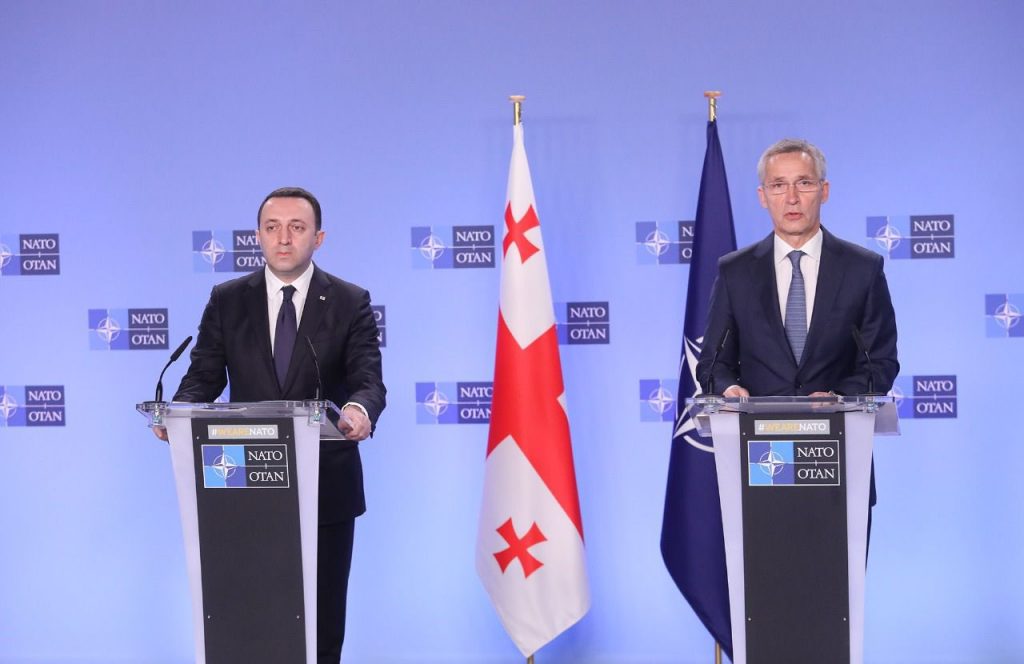“It is vital that the work on judiciary reform, media freedom and accountability of the security sector continues,” highlighted NATO Secretary General Jens Stoltenberg in a joint press conference with Georgian Prime Minister Irakli Garibashvili on December 15, after their meeting in Brussels.
The NATO chief said the Alliance expects “Georgia to uphold the democratic standards that it has worked hard to develop in the recent years.” He also called on the Georgian Prime Minister to work with the opposition to “resolve political differences and reduce polarizing rhetoric and actions.”
The Secretary General noted that during the meeting, besides the domestic situation in Georgia, they addressed regional security as well as Russia’s “destabilizing activities” in the Black Sea region.
Touching upon Russia’s “military buildup in and around Ukraine,” Secretary-General Stoltenberg said “we agree on the need to remain vigilant, and avoid escalation. Any future Russian aggression would come at a high price and have serious economic and political consequences for Russia.”
Alluding to Moscow’s demand for NATO to disavow the 2008 Bucharest Summit decision that Georgia and Ukraine will eventually become members of the Alliance, the NATO chief said the two aspirant countries “have the right to choose their own alliances and Russia had no right to dictate that choice.”
“We reject any idea of spheres of influence in Europe, they are part of history and should remain part of history,” he asserted, going on to pledge that the Alliance will continue to provide political and practical support to its partners. “We are working to strengthen Georgia’s defense capabilities with maritime support, joint exercises and information sharing.”
The Secretary General also reiterated the Alliance’s support to Georgia’s territorial integrity and sovereignty, and hailed the country’s participation in NATO missions over the years.
- NATO Says Russia Has No Right to Control Neighbors
- Tbilisi Irked as Russia Urges NATO Disavow Georgia, Ukraine Membership Promise
Prime Minister Garibashvili, on his part, stated that Georgia has achieved “significant progress” on its Euro-Atlantic integration course, going on to stress that “time has come to advance the integration process and take concrete political decisions.”
“This will be a clear message to aspirant countries that commitment, dedication and hard work pays off,” he argued, adding “It will be a strong message that will echo to the whole wider region that NATO is as present and as strong as ever.”
The PM reiterated that “membership of NATO is a top foreign and security priority of Georgia, which is supported by the absolute majority of our people.”
He argued that Georgia has “all practical tools to join NATO, and for that, we have an active dialogue with the Allies to prepare a political decision regarding Georgia’s accession to NATO.”
The Georgian PM stressed that the 2008 Bucharest Summit decision was “a strong message, which still resonates today,” adding that “each and every state has their sovereign right to choose their foreign policy course.”
He noted that successful implementation of the decision is “as relevant for NATO as is for Georgia.”
Stressing the importance of Black Sea security, the PM argued “it has become evident that Euro-Atlantic security is impossible without a secure and stable Black Sea region.” PM Garibashvili said NATO’s increased presence in the Black Sea is on the other hand vital for the stability of the region.
The Georgian Prime Minister in visiting Brussels today, and will also attend the EU Eastern Partnership (EaP) Summit.
Also Read:
- In OSCE, Russia’s Lavrov Pushes For Deal Preventing NATO Enlargement
- Secretary Blinken Says NATO Doors Open to Georgia, Ukraine
This post is also available in: ქართული (Georgian) Русский (Russian)

